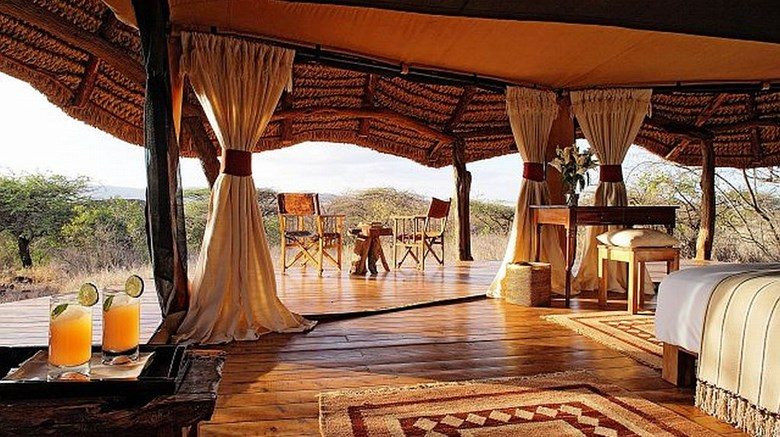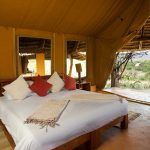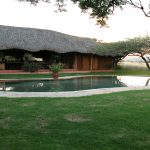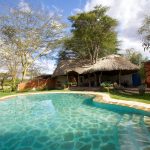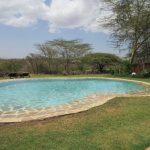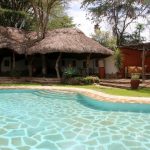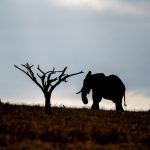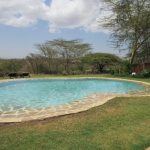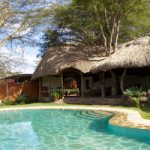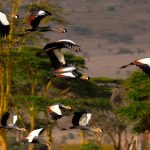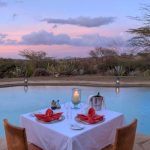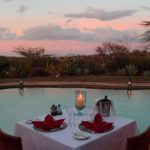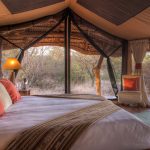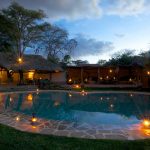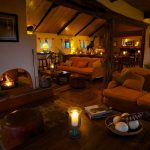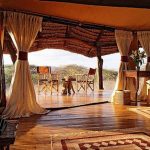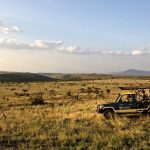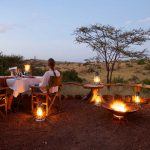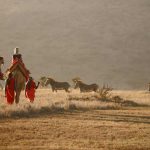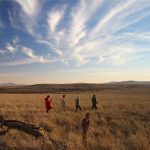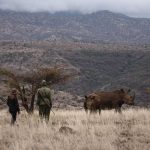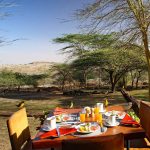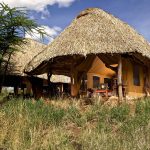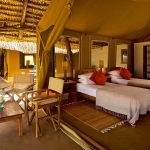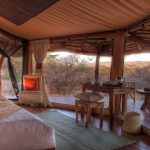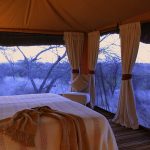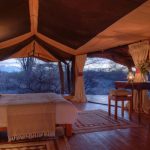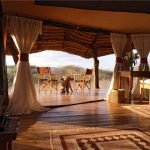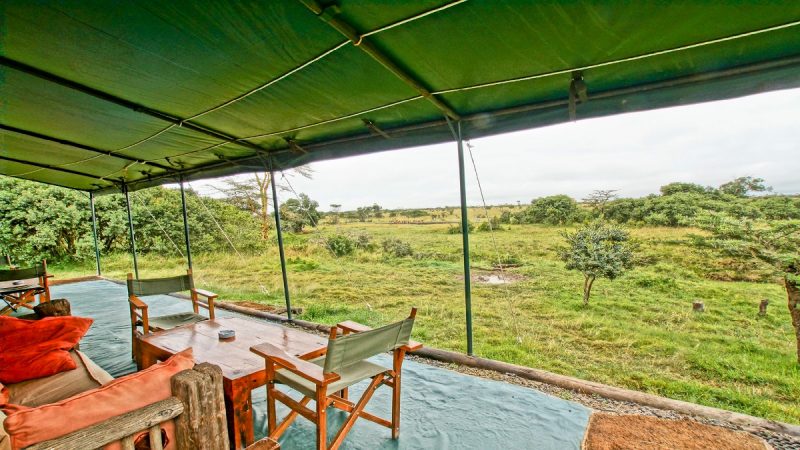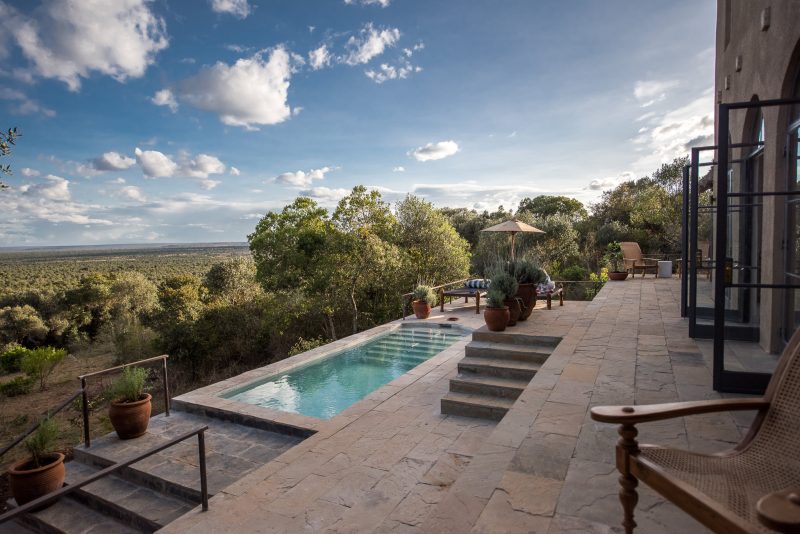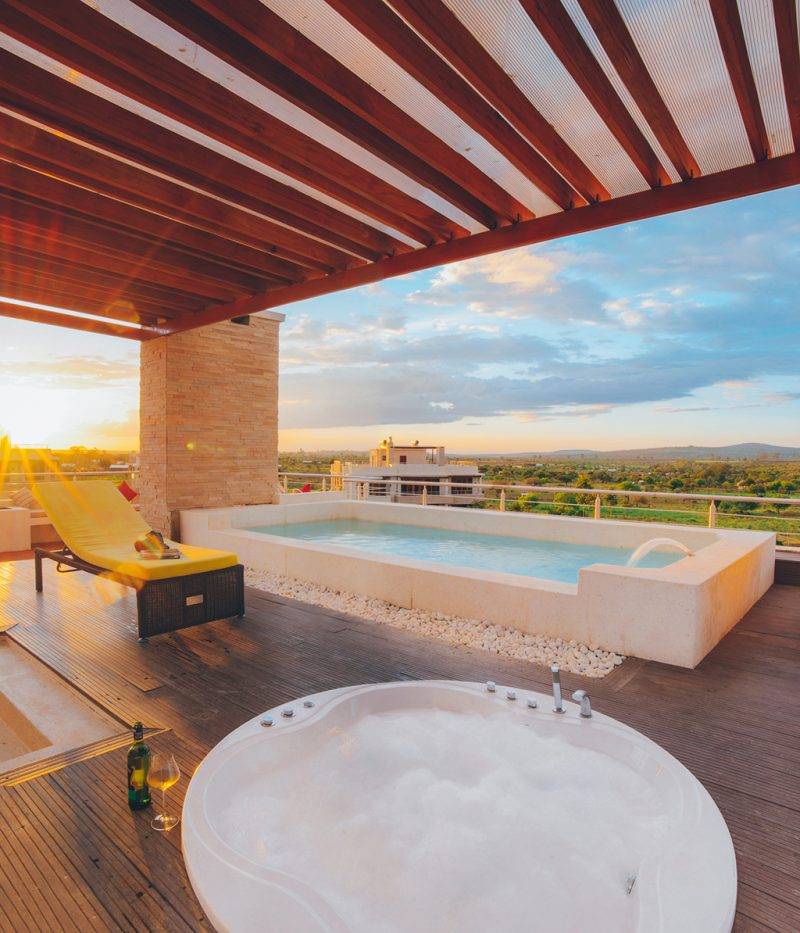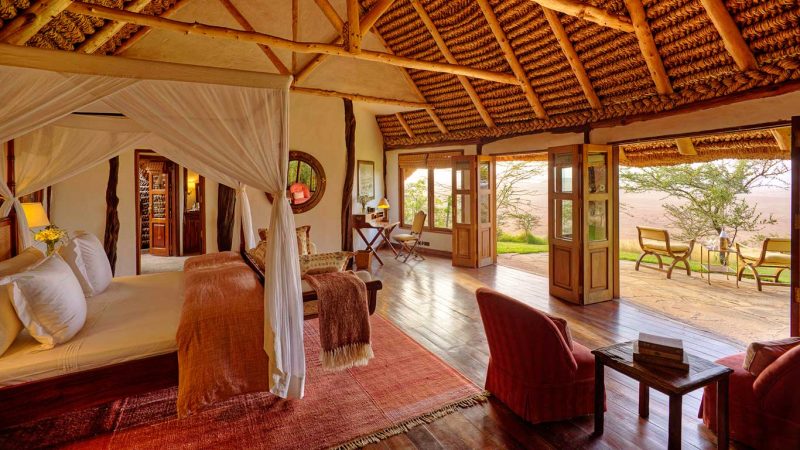Over and above the funding that Lewa safari camp generates for the Lewa projects, they encourage additional donor support for Lewa education programme. The programme supports 12 schools in the surrounding communities, providing classrooms, kitchens, teachers’ housing, a feeding programme reaching over 4,000 children, bursaries for over 500 students, assistance to 60 orphans, adult literacy catering for 300 people and education running three times a week, open to students all over Kenya. If you would like to visit one of the schools during your safari, a minimum $50 donation for the Lewa education programme will be applicable per person. Please note that the Lewa education programme allocates all donations received according to current priorities.
One of the most intriguing animals on the planet is the black rhinoceros. This distinctive mammal can reach weights of 1,400kg and prefers a solitary existence. Apart from the animal’s size, the black rhino is also distinguished by a hooked lip used to feed off trees. This giant beast enjoys legumes, woody twigs and various varieties of plants. Mineral licks are especially inviting and the black rhino enjoys a healthy dose of water every day. Black rhinoceros prefers to eat at night and sleep during the day. Like its cousin, the white rhino, the black rhino is actually gray but is easily distinguished by its pointed upper lip whereas the white rhino has squared lips.
Favourite hobby
These enchanting animals like to be near water. One of their favourite pastimes is wallowing in muddy water which helps manage the heat, their body temperature and provides a good line of defence against insects. The sheer size of the mammal is enthralling.
Rhino conservation
The black rhinoceros is in jeopardy of extinction and would certainly have fared much better had hunters and poachers not pursued them for many years. In February 2013, the worldwide population of black rhino was estimated to be 4,880, a sharp fall from 30 or 50 years ago. Its numbers have increased to 6,487 as of the latest statistics of 2024 from World Animal Foundation, a leading organisation in advocacy. However, today, the black rhino, which once ranged the sub-Saharan Africa in plentiful quantities, is still classified as a critically endangered species. The entire black rhino population is limited to the area between Cameroon in the west and Kenya in the east. Some black rhinos still roam as far south as South Africa, although these are few.
Horns
The animal’s distinctive and valuable horns is the feature that unfortunately today’s poachers treasure. The horns are regarded by several cultures as highly medicinal. Hunters kill the animals and pull the horns, leaving the carcass while they ship the horns to countries such as China, Taiwan, Hong Kong and Singapore. In the Middle East and in North Africa, the horns have also been used to shape ornamental dagger handles. The results have been catastrophic.
Breeding periods
Male black rhinoceros are solitary by nature. Females and their offspring tend to be more social. Males can be aggressive during mating period, often fighting and killing other suitors. Despite their seemingly calm demeanour, these are powerful and strong animals.
Reproduction
Typically the female reproduces once every three to five years. The gestation period of the female black rhino is between 419 and 478 days. Calves are slow to mature. Calves begin to wean at about 2 months. Most calves stay with the mother for three years or more. Very often female black rhinos and their females calves group with other females and their calves. The mother is more likely to stay with a female calf for longer periods of time than she is with the male calf. The male father may offer some early protection but soon departs to pursue other interests. Black rhino calves reach their full sexual maturity in 4-5 years but rarely give birth before age 7.
Lewa safari camp guides
The Lewa safari camp guides are based in camp within Lewa Wildlife Conservancy, and are some of the best guides in the country. Most are from neighbouring communities and have been guiding within the Conservancy for many years, some for over 15 years, they know the botany of the area, palaeontology history of the Lewa, as well as an intimate knowledge of the rhinos, cheetah and lion families. The guides are bronze or silver level Kenya professional safari guides association certified, and they also receive training to the “Lewa Standard”. The walking guides are trained armed rangers.
Horse or camel riding
Lewa safari camp offers evening horse rides – you can get very close to plains game as they see you as one of their own! Horse riding is for experienced riders only, as although it is a gentle walk on very well behaved horses, you are in the wild, and need to be able to bring a situation under control when horses are spooked. Horse riding is subject to availability and there is an additional charge. Riders will be requested to fill out a questionnaire to ascertain their competency. Lewa safari camp also offers evening camel rides – less elegant than horse-riding, but suitable for those without riding skills, the camels are led by Samburu handlers and it is picturesque experience. Camel riding is subject to availability and there is an additional charge. There are only three riding camels available.
Honeymoons
There is nothing more romantic than a safari! Already an unforgettable, once in a lifetime and pampered experience, safaris offer incredible sunsets, romantic tents and relaxed al fresco dinners. The beautiful setting at Lewa safari camp is ideal for that very special holiday.
Weddings
Over the years, we have hosted many weddings, blessings and vow renewal vows for our guests from small simple ceremonies involving merely a glass of champagne at the end of a game drive to three day events with over 30 guests. Options include legal marriages conducted by the local commissioner or religious minister or blessing by the chief of the local tribe.
Family suites
Lewa’s two new family tents are ideal for families with children. Under a thatched roof, the spacious canvas tents each comprise of an en-suite master bedroom and an en-suite twin room, which are joined together by a private veranda/sitting area with stunning views over the Lewa plains. The en-suite bathrooms have flush toilets and hot water showers. An extra bed for a third child under 16 years can be accommodated in one of the Family Tents to accommodate a family of 5.
Climate
The days are warm, rising to maximum of 30 deg C, but comfortable with minimum humidity, and the evenings are cool with cosy blankets on the beds. Rainfall is mostly in May and November with an average of 360mm per year.

